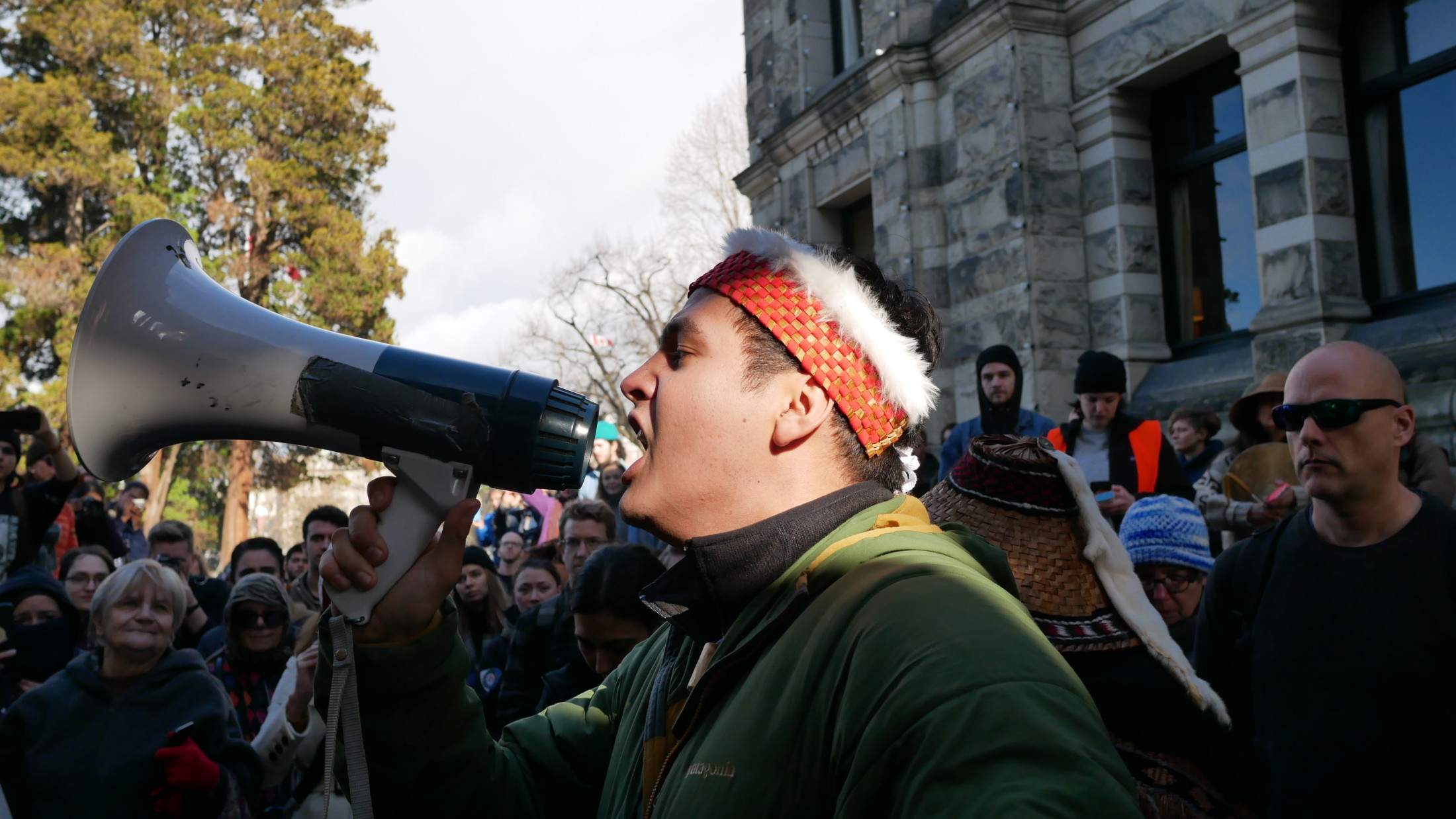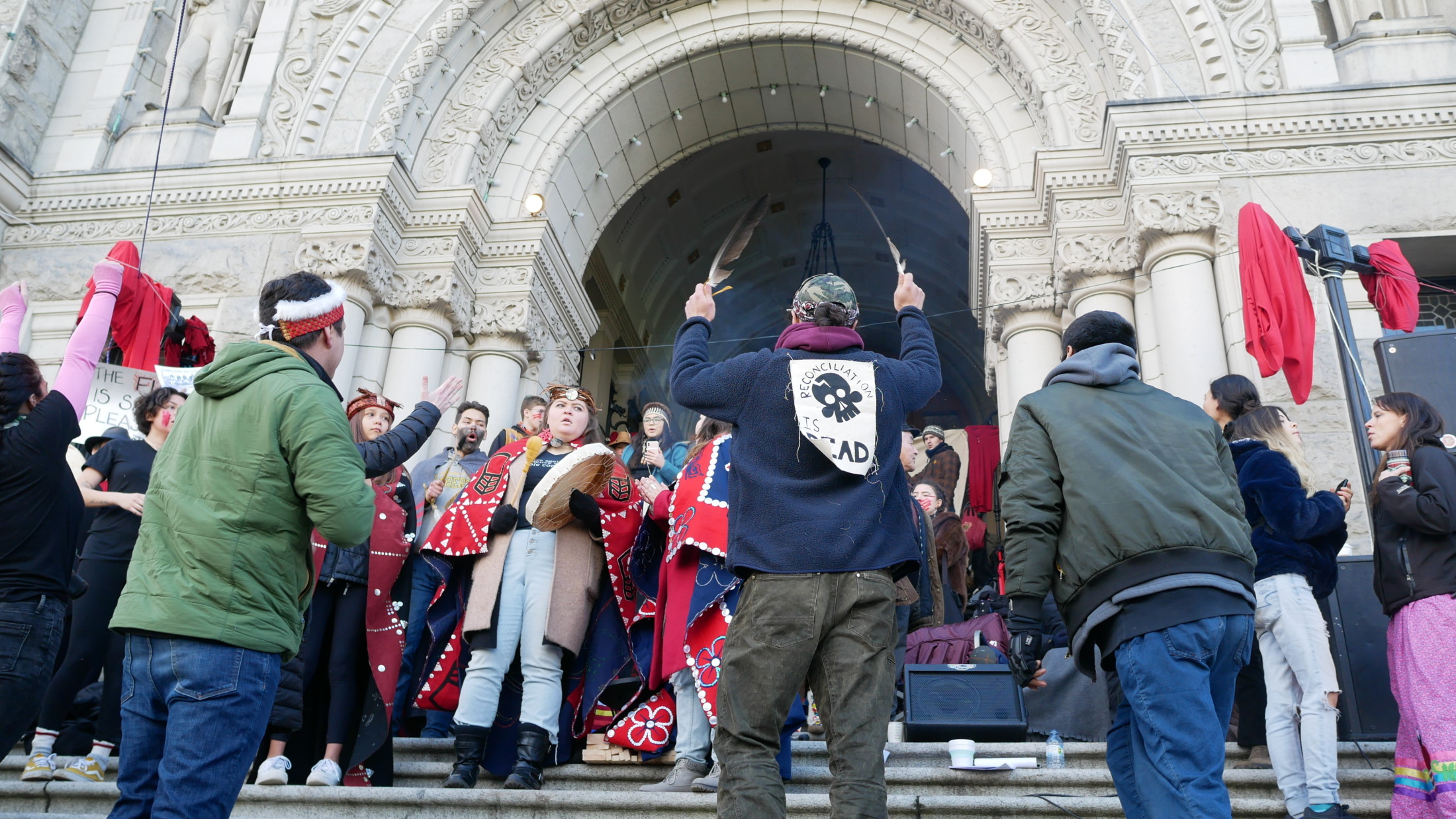
What’s scarier for Canadian communities — floods, or flood maps?
When maps showing areas most likely to flood are outdated, it puts people and property...
Feb. 11 was the hardest day yet as MLA for interim B.C. Green Party leader Adam Olsen, or SȾHENEP.
In a solidarity action to support the hereditary chiefs of the Wet’suwet’en opposed to the Coastal GasLink pipeline crossing their traditional territory, hundreds of people blocked the doors to the legislature for a planned speech from the throne that would open B.C.’s new parliamentary session.
Olsen, a citizen of the W̱SÁNEĆ (Saanich) Nation and member of the Tsartlip First Nation, was escorted through the crowd by members of the police as people shouted at him to ‘stand with Indigenous people.’
In an interview with The Narwhal, Olsen said he looked out at the crowd and thought, ‘I am.’
In a speech the following day, Olsen forcefully criticized MLAs in the assembly for the role they played in igniting the crisis, which to this day, is reverberating across the country in blockades, demonstrations and arrests. He also recalled his experience entering the B.C. legislative chamber in 2017 wrapped in a blanket with the support of his family.
“It is that powerful expression of love that my family showed for me, even after what generations of decision-makers in this very chamber did to them, that I must now show a compassion and love for this institution,” he told the chamber.
In conversation with The Narwhal, Olsen said he remains committed to his role in government, the empowerment of Indigenous governance and the country’s pursuit of reconciliation, despite challenges and setbacks.
This interview is edited for brevity.
A: There was a lot of silence around me. A lot of people making busy. But I have no intention of making shortcuts. I really believe that part of the tragedy of where we stand right now is because the people in these institutions over the decades have been taking shortcuts on these issues and it hasn’t served us well in the past.
It’s not okay to ignore a decades-old problem … I heard the leader of the official opposition [BC Liberal Party Leader Andrew Wilkinson] talking about a ‘small group’ of people, kind of downplaying the Wet’suwet’en and hereditary chiefs and their legitimacy. It’s important to recognize that this is no small case. [The Delgamuukw decision] took years of preparation, months of testimony, and it is not to be undermined.
This government put together an obscene, taxpayer-funded corporate welfare program that essentially lured the final investment decision out of LNG Canada. Our independent colleague [Andrew Weaver] spent a lot of time during the debate of that Income Tax Act stating that this is not the thing that we should be doing in a climate crisis, investing taxpayer money in an industry that can’t survive without it. That we should not be trying to attract the expansion of fossil fuel infrastructure. And that there were unresolved issues in Wet’suwet’en.
So then to be told, “it’ll sort itself out, it’s fine” — the result is that it’s not being sorted out, it’s not fine.
A: Well, I was trying to get in the building into another door, a side door, and I was being told by the people that were there that I should stand with Indigenous people. That I should be standing with Indigenous people. And I said, “but … but that’s me.”
They said, “stand with us, stand with us.” And I said, “I am” — in the sense that I’m raising these issues. I’m not standing outside because my job and my world is actually inside. While they might not agree with the institution, I was brought in here in a good way. Even in the face of the great challenges that my family has faced from the decisions of this institution, they brought me in here in a good way to do a job.

B.C. Green Party interim leader and MLA Adam Olsen presses through a crowd of blockaders to enter the B.C. legislature Feb. 11. Photo: Carol Linnitt / The Narwhal
So then I went around the other way and the experience that I had was devastating to me. I don’t know, having a megaphone yelling in your ear demands and in a very angry way … I don’t know, it just stands for itself, it just is what it is. The picture is on the front page of the paper, you can see it, it was not a pleasant experience for me.
I think I said it best in my speech. The advice I’ve been given by my elders is to be very careful with what we do with power. And you can use your power to build people up, or you can use the power to tear people down, and tearing it down is always far easier than building it up. Building it up requires a lot more work and a lot more investment and a lot more time. I come in here every day to build up.
I felt the pain of the people, and I speak to the substantive frustration that’s created by decisions about their future. I will persist here to continue to try to affect better outcomes and to do that work. I strongly believe there needs to be an understanding of what they’re saying, but there needs to be great care in how they say it.

Saul Brown, Haíɫcístut negotiator from the Heiltsuk Nation, speaks to a crowd gathered outside the legislature. Photo: Carol Linnitt / The Narwhal
A: For the first time there’s an opportunity for Indigenous Peoples to embrace self-determination. There is an opportunity for feasts and potlatches and gatherings and coming together of Indigenous communities to talk about how they want to be governed … and to approach the provincial government and say “this is how we want to be engaging with you.” The government now has a law [The Declaration on the Rights of Indigenous Peoples Act] that says they have to respect that. That’s a new thing and a thing that we should celebrate.
I think the provincial government should be operating in good faith and really put a lot of resources in to show Indigenous people and the broader public that they mean what they say. That investment in moving forward and leaning in is really important in the next weeks and months going ahead.
A third piece, I think, is to rebuff at every time that it’s said that reconciliation is dead. No, it’s not. It cannot be. If it is, we die with it. We know too much, we’ve seen too much. There is no turning around on this path. I will continue and always rebuff a notion that we can simply say this little experiment over a few years didn’t work, so that’s it, it’s over.

Crowds gather in support of Wet’suwet’en hereditary chiefs outside the B.C. legislature, where a sign, reading ‘reconciliation is dead,’ is posted on the lawn, Feb. 11. Photo: Carol Linnitt / The Narwhal
We live next door to one another, our kids go to school with one another. We have partnerships, we love each other. There are people like me who have got a mixed heritage, whose lives make zero sense if we’re at war and fighting with each other. I understand the frustration and I understand the statement. But I will also push back and say it may feel that way now, but I’m not giving up. In fact, this is the moment in which I push harder forward and look for a good way and a good outcome.
How the Wet’suwet’en crisis could have played out differently
A: The response has been, ‘thank you for explaining this.’ ‘Thank you for being willing to open up and be vulnerable about all the different aspects of this which are kind of kicking your ass right now.’
Because — and you can publish this — my ass is being kicked all sorts of different ways on this.
Often times what ends up happening is rhetoric, propaganda, simple language, simple messaging. “Their issues.” “They’ll deal with it.” Nobody taking responsibility. I’m prepared to say where responsibility lies. Some of it has to do with deliberate government policy, some of it has to do with the dysfunctional relationship that evolved out of that.
It really makes the position that I am in enigmatic, in a way. I am kind of all parts of this conversation: the political, the social, the personal, the environmental, the economic. I kind of just got dropped right in the middle of it.

Indigenous youth occupy the B.C. legislature in a solidarity action with Wet’suwet’en hereditary chiefs on Feb. 11. Photo: Carol Linnitt / The Narwhal
A: My origin story as a politician, or actually as a productive member of society, is I went through the sort of existential crisis of being ‘the other.’ I have referred to myself in the past as being the Indian in a room full of white people and the white person in a room full of Indians. It’s always been othering, right?
It was a conversation I had at the turning point of my life when I was going through some of these really big questions that my grandmother, my dad’s mum, actually said those words to me: that as a person with a foot on both sides of the line, I have a really dramatic opportunity to be involved and to help bring this forward. I have no idea what she pictured in her mind when she saw that. And on Feb. 14 it will be, I think, 13 years since she passed. She was the matriarch, I am one of 275 descendants at the time of her passing directly from her. I got the honour of delivering and preparing her eulogy. I was given the beautiful honour of telling her story.
I don’t know what she pictured when she was giving me that advice, and she was sitting behind the click-clacking of her knitting needles. But her advice produced the first Saanich-born MLA. That’s pretty cool. So, for however long I get the honour of representing that place, I’ve just made the commitment to do it fiercely and with courage, and to try to advance the conversation as much as possible.
Enbridge Gas will face Waterloo Region in a hearing before the Ontario Energy Board to renew an agreement that would allow the company to continue...
Continue reading
When maps showing areas most likely to flood are outdated, it puts people and property...

We’re suing the RCMP for arresting a journalist on assignment for The Narwhal. It’s an...

As glaciers in Western Canada retreat at an alarming rate, guides on the frontlines are...